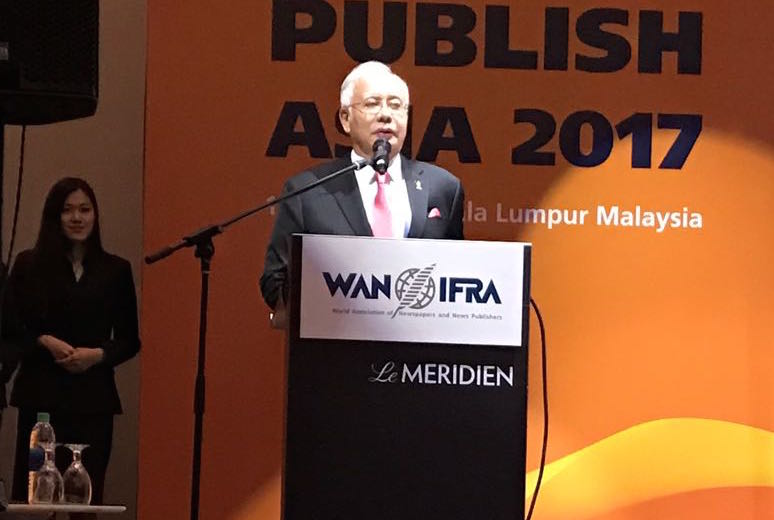A gathering of Asia’s biggest newspaper and publishing figures, in town to discuss “challenges to press freedom, the safety of journalists and sustainability” among other issues, last night heard from arguably the nation’s most important voice on the subject.
Speaking to a room of hundreds attending the Publish Asia conference at Kuala Lumpur’s Le Meridien Hotel, Malaysian Prime Minister Najib Razak spoke at length on the topic of press freedom in a 30-minute speech that took specific issue with the proliferation of online news sources and a favorite talking point of the Donald Trump administration: fake news.
“A free press is a guarantor of accountability and transparency,” he said. “[A free press] should also be a guarantor that the still, small voice of truth is heard amid the maelstrom of both information, and misinformation that new technologies have reached.”
The legitimacy of those new, primarily digital, news sources, Najib went on to say, was anchored by the trust in their print predecessors. Even if the print publication has ceased daily distribution, these news sources have “a degree of respect that newer, net only publications, struggle to gain.”
Using this as a pivot, he went on to focus on the perils of fake news, even citing the damage it had done to Hillary Clinton’s failed 2016 presidential bid, highlighting the infamous, and wholly untrue, “Pizzagate” scandal.
The unfounded claims of a child-sex ring associated with a member of Clinton’s camp operating out of a Washington DC pizza shop, inspired a man to walk into the pizza parlor with a gun, claiming he was investigating the rumors.
“People only narrowly avoided being shot,” Najib said. “Others received death threats, and in the end, Mrs Clinton had to address the issue in the end herself. But it was completely made up, and it was found to be based on a tweet sent out by white supremacists, seen by millions of people, and unfortunately believed by some of them.”
While Malaysia’s track record on press freedom has come under attack from rights groups and international news sources for shutting down voices of dissent and questions over 1MDB, the prime minister said his government has, in fact, “opened up the space for democratic scrutiny.”
From opening the floor to opposition newspapers, to relaxing licensing laws that had previously been used to muffle the voices of dissent, the premier rattled off a laundry list of ways in which his government has opened the door for a freer press.
It’s enough to make a listener recall that until the closely contested 2012 election, Najib was, in fact, seen as a liberal: a man who had begun to dismantle the arcane laws of the previous guard, someone who did bring increased press freedoms, who tried to loosen the policies of Malaysia’s reverse affirmative action that saw the Malay majority favored over Chinese and Indian.
His loss of middle-class, urban support in the election – for not taking his reforms far enough – saw the premier increasingly depending on more right-wing political forces that had little interest in those reforms.
Three years later, even long-time ally the United States is taking note of the rolling back of press freedoms, criticising Malaysia’s “recent actions to restrict access to domestic and international reporting on Malaysian current affairs.”
So where does this leave Malaysia?
On one hand, the PM speaks of fake news. Quoting Jonathan Swift in crisp, Malvern College English, he told journalists: “Falsehood flies, and truth comes limping after it, so that when men come to be undeceived, it is too late; the jest is over, and the tale hath had its effect.”
Yet minutes later, he was taking a veiled swipe at the award-winning, 125-year old Wall Street Journal. While seemingly ticking his boxes – namely a rich print heritage and accountable reporting – he called their anonymous sources unfounded, questioned their veracity, and wondered why they promulgate questionable headlines.
It’s enough to make the listener ask: Where does fake news end, and simply bad news begin?





Reader Interactions